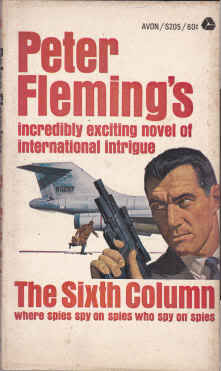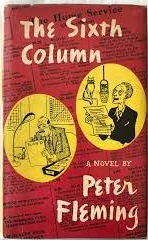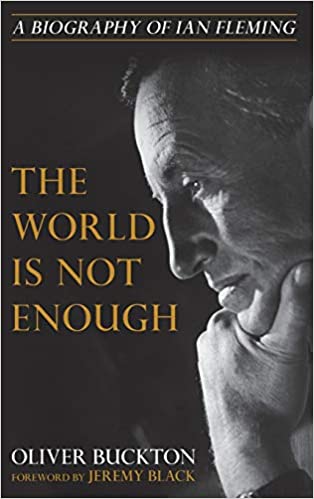Article by Oliver Buckton
One of the most puzzling questions about Ian Fleming’s career as an author is why it took him so long after the end of World War II to write the first James Bond novel. During the war, his service in the Naval Intelligence Division (NID) as assistant to DNI Admiral John Godfrey involved Fleming with ample experience of secret operations, deception plots, and thrilling agents to furnish the storylines for several novels. Wartime NID Operations such as “Mincemeat,” “Ruthless,” and “Goldeneye” would indeed surface later in Fleming’s fiction. The latter operation—designed to protect Gibraltar in the event of a German invasion of the Iberian peninsula—even gave its name to Ian’s home on the north Jamaican coast near Oracabessa, where the Bond novels were written each winter.
During the war, Robert Harling, his friend and officer in 30AU—Fleming’s Commando Unit for daring intelligence grabs behind enemy lines—had asked Fleming about his plan after the war ended: “I am going to write the spy story to end all spy stories,” Fleming informed him. In 1944, Ian made his first visit to Jamaica in the company of his old Eton friend Ivar Bryce to attend an Anglo-American naval intelligence conference. Bryce’s wife owned a home in the Blue Mountains, where the two friends stayed. Despite the terrible weather, Ian made a startling announcement on the flight back to New York: “When we have won this blasted war, I am going to live in Jamaica. Just live in Jamaica and lap it up, and swim in the sea and write books.” (YOLT 72). Yet, despite this determination, it would be ten years before Ian sat down at his typewriter in Goldeneye and wrote the first draft of Casino Royale.
What was the reason for the long delay?
Ian was of course still bound by the restrictions of the Official Secrets Act—which kept ULTRA material among other sources buried for many decades—and understandably took this burden quite seriously. If he was to publish books about his wartime experiences, he would have to find a way to disguise the sources. For example, his colleague in Naval Intelligence, Ewen Montagu, would explain the reasons for his delay in writing about his role in Operation Mincemeat: “I naturally could not speak or write about it until a fictional story partially based on this operation… made it clear that it would no longer be possible to maintain that secrecy which all of us who took part in the operation had preserved” (The Man Who Never Was).
But there remained another serious problem, or obstacle, blocking Ian’s literary debut: namely, his older brother Peter. Peter Fleming’s life mirrored Ian’s in many ways. Born almost exactly one year before Ian, Peter took precedence when the brothers attended Durnford Prep school in Dorset, followed by Eton College where Peter was an academic star while Ian struggled (though he shone at athletics). They both spent time in Kitzbühel under the tutelage of the Forbes-Dennises, and both brothers served in British intelligence during World War II. However, Peter had launched his literary career before the war with in 1933, with Brazilian Adventure. This thrilling yet witty travelogue narrated the doomed expedition, of which Peter was a member, to track down Colonel Fawcett, the British explorer who had gone missing in the Amazon jungle.
This successful debut was followed by other notable books such as One’s Company and News from Tartary (1934). Along with Peter’s glowing academic triumphs—including a first-class degree from Christ Church, Oxford—these books were indeed intimidating achievements in the eyes of a younger brother who had not struggled to find his way in life. Ian’s failure to enter the Foreign Office had only deepened his inferiority complex. Even after the war, Peter was “the writer” of the Fleming’s family.” Ian’s insecurities led him to avoid a daunting effort to rival or surpass his older brother’s literary success.
In this light, perhaps this piece began by asking the wrong question. The real puzzle is not why it took Ian so long to start writing, but why he started writing at all. Or rather, why he finally bit the bullet—to use an aptly Bond-like metaphor — in January 1952 and hammered out Casino? Ian offered, as the reason for his sudden flurry of activity, that he was anxious about his impending marriage to longtime lover Ann Rothermere (née Charteris). The couple would marry in March 1952 in Jamaica, following Ann’s divorce from Lord Rothermere, but Ian recalled he was in a near panic about surrendering his bachelor existence.
In a later essay, “How to Write a Thriller” Ian explained how his leisurely winter sojourns in Jamaica were exchanged for literary labor: “For the first six years I had plenty to do during these months exploring Jamaica, coping with staff and getting to know the locals, and minutely examining the underwater terrain within my reef. But by the sixth year I had exhausted all these possibilities, and I was about to get married—a prospect which filled me with terror and mental fidget. To give my idle hands something to do, and as an antibody to my qualms about the marriage state after 43 years as a bachelor, I decided one day to damned well sit down and write a book.”(1) This anecdote may strike the reader as beguilingly honest, or as disturbingly selfish. But one should, in either case, stop to consider whether it is actually true. Ian was a master of deception, a craft he honed during his years in wartime intelligence. In particular, he had perfected the art of a “smokescreen”—an apparent action that conceals one’s true intention and purpose.
Hence, Fleming neglects to mention in “How to Write a Thriller,” that by the time he went to Jamaica in January 1952 Peter had just published in 1951 a spy novel, called The Sixth Column: A Singular Tale of our Times, with the esteemed publisher Rupert Hart-Davis. Peter’s first full-length book since News from Tartary, The Sixth Column, contained elements of dry humor, political satire, even spoof, that make it on the surface very un-Bond-like. This, in other words, was certainly not the spy novel to end all spy novels that Ian aspired to write. But still, his older brother had once again trumped him, gaining the upper hand by publishing a novel recognizably in the genre that Ian had—at least in his imagination—carved out as his own literary territory. Peter’s novel also introduced a meta-fictional twist, as its protagonist was, as Ben Macintyre notes, “a thriller writer who creates a protagonist with marked similarities to Bond.” (2) By making his protagonist a thriller writer rather than an actual spy, Peter Fleming satirizes the far-fetched conventions of spy fiction, the kind of novels Ian read and wanted to write. Perhaps this was a gentle mockery of his brother’s aspirations.
Peter acknowledged the tongue-in-cheek tone of The Sixth Column in his introduction: “It is true that not all the strange occurrences with which the narrative deals are treated with that high seriousness which transfigures the work of more respectable authors.” Despite this disclaimer, the novel deals with a conspiracy to undermine the British character, which, Peter suggests, reflects a contemporary concern about the morale, culture and prestige of postwar Britain. The head of Section D. 2 (d)—a division of Military Intelligence (MI5) dedicated to countering “suspected attempts to upset the balance of nature in the United Kingdom”—is presented with a discovered document known as “Plan D.” This document had been found on an airplane by the sister of one of Section D. 2 (d)’s secretaries, and its contents address “the most promising methods of accelerating the current deterioration of the British national character with a view to undermining and eventually eliminating British influence in the affairs of the world.” (3)
Even though the preoccupation of Section D. 2 (d) with attempts to upset “the balance of nature” might initially strike the modern reader as ludicrous, it curiously anticipates the consistent focus on environmental threats and ecological damage posed by the villains in Ian’s novels. For example, Peter’s imaginary section of MI5 suspects that the “grey squirrel had been deliberately introduced into these islands by German agents before the First World War” and imagines “how easy it would be for the King’s enemies to infiltrate into Great Britain birds, beasts, insects, or indeed fish, which might have unbalancing and perhaps even disastrous effects on our precarious agricultural economy!” (Sixth Column, 11-12). Peter’s work anticipates the deceptive and anti-British plots of Ian’s Dr No, eponymous villain of his sixth novel, who destroys fragile roseate spoonbills in order to strengthen the profitable colony of guanay birds while sabotaging American missiles.
Peter’s fictional conspiracy also looks ahead to the unnatural plots of Ernst Stavro Blofeld in On Her Majesty’s Secret Service, where Bond’s nemesis attempts to destroy Britain’s “precarious agricultural economy” by using female “angels of death” to introduce bacteriological agents, thereby infecting the UK’s crops and livestock with sterility.
In the following year’s You Only Live Twice, Blofeld—now living in a Japanese castle under the pseudonym Dr Guntrum Shatterhand—introduces alien and poisonous species of plants, flowers, and fish into Japan, creating a “garden of death” designed to lure suicides to its fatal snares. In both novels, Blofeld’s conspiracies can be traced back to the presumed threat to Britain’s “balance of nature” presented in The Sixth Column. Even Plan D—a conspiracy to create enemy “agents of influence” among Britain’s literary, political, and cultural elites — is targeted for action by Section D. 2 (d) on the grounds (in Captain Volpard’s words) that “monkeying about with our national character! If that’s not upsetting the balance of nature I’m damned if I know what is!”(16). James Bond was, of course, created by Ian in part as an antidote to this perceived decline in Britain’s moral fiber.
As James Bond took off in literary form, surpassing his own success, Peter Fleming would generously serve as part of Ian’s team of “Capeians”—the editorial group working with his publisher Jonathan Cape — who provided Ian with valuable feedback and suggestions about his typescripts. But perhaps Peter’s most valuable contribution to the success of Bond—and Ian’s—success was to publish a spy novel that drove Ian into competitive effort and hard work at the typewriter. Fittingly, Peter dedicated his novel to “my brother Ian.” Was this an attempt to jolt his younger sibling out of complacency induced by the life of tropical ease in Jamaica, and remind him of his unrealized literary aspirations? If so, it surely had the desired effect.
(2) Ben Macintyre, For Your Eyes Only: Ian Fleming + James Bond (Bloomsbury, 2008), 52.
(3) Peter Fleming, Sixth Column (Hornchurch, Essex: Ian Henry, 1975) 9, 11, 15-16.
Incidental Intelligence
Oliver Buckton is author of The World is Not Enough: A Biography of Ian Fleming, which is published by Rowman & Littlefield on June 12, 2021.
This new biography of Ian Fleming presents a fresh and illuminating portrayal of the iconic creator of James Bond. Oliver Buckton provides the first in-depth exploration of the entire process of Ian Fleming’s writing from initial conception, through composition, to his involvement in the innovative publication methods of his books.
Offering a radically new view of Fleming’s relationships with women, Buckton traces the role of strong, independent, and intelligent women such as Maud Russell, Phyllis Bottome, and his wife, Ann, on Fleming’s portrayal of female characters.
The book concludes with a thorough analysis of the James Bond films from Eon productions, and their influence in promoting, while also distorting, the public’s recognition of Fleming’s writing.
Oliver Buckton is professor of English at Florida Atlantic University. He is the editor of The Many Facets of Diamonds Are Forever: James Bond on Page and Screen and author of Espionage in British Fiction and Film since 1900: The Changing Enemy. He lives in Delray Beach, Florida.
Listen to an interview with Oliver on James Bond Radio here.







Wonderful article on the literary Fleming brothers. Writing about sibling love and rivalry is so difficult to do well, and Dr. Buckton balances facts and speculation, speculated emotions and objective knowlege, perfectly.
Pingback: A Tale of Two Brothers: Ian Fleming, and Peter Fleming’s The Sixth Column – Andy Onyx writes..